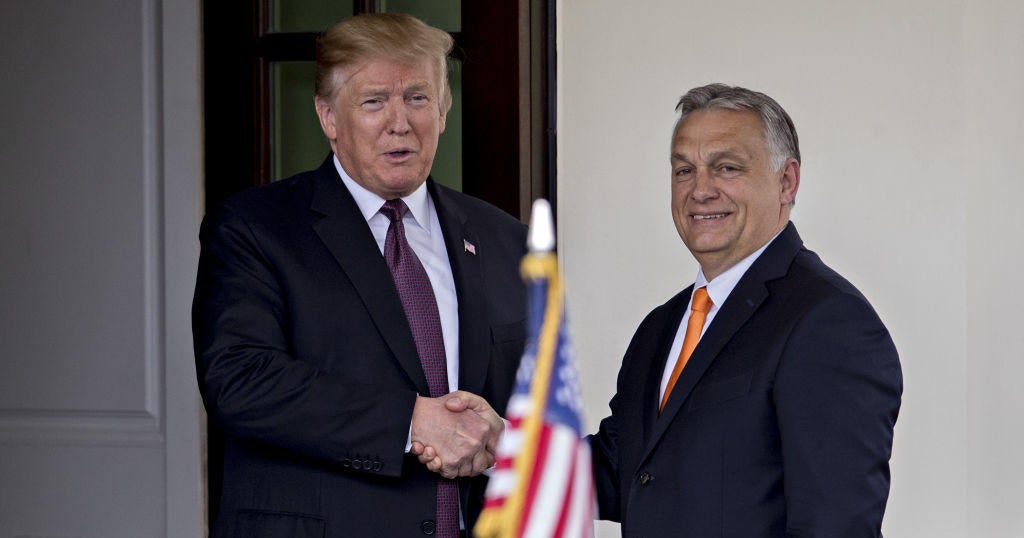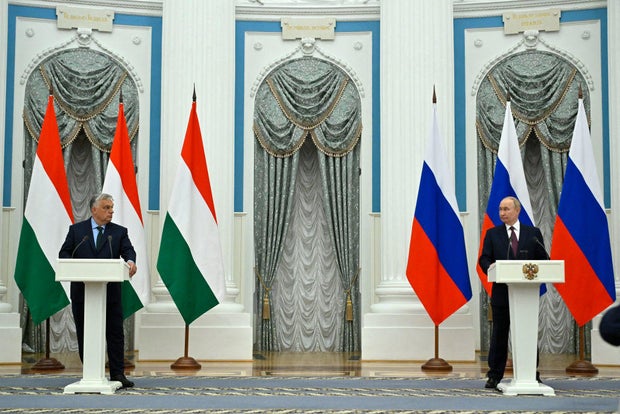CBS News
Should you use your home equity now? Experts weigh in

Nata-Lia/Getty Images
The last few years have been tough for borrowers. High interest rates and steep home prices have made getting loans hard for many people. But things are looking up — the Federal Reserve just cut interest rates for the first time this year, and more cuts might be coming.
This shift has many homeowners thinking about tapping into their home equity. Josh Green, a mortgage loan officer at Barrett Financial Group, observes an interesting trend: “[More] homeowners are staying put and [using] their equity to improve their [homes] instead of selling and moving.”
But is this the right move for everyone? We asked three industry experts to weigh in on whether now is a good time to get a home equity loan or home equity line of credit (HELOC). Their insights below can help you decide if borrowing against your home’s value makes sense.
See how low of a home equity loan rate you could qualify for here.
Should you use your home equity now?
Experts say tapping into your home equity now can be wise, but it depends on your situation. Before you borrow against your home’s value, weigh these pros and cons:
Pros of home equity borrowing in today’s market
Home improvements top the list of reasons to tap into your home equity, according to Green. “Homeowners are feeling stuck in their current homes because they don’t want to lose their low mortgage rates,” he says. “So, they’re using their equity to [renovate] instead of buying something new.”
City Creek Mortgage’s co-founder, Mike Roberts echoes this sentiment, adding that certain renovations can make your money work for you. “[You can boost] your home’s value [and lower ongoing expenses] with energy-efficient upgrades,” he notes.
Knoxville realtor, Elizabeth Donaldson highlights another advantage: “Home equity loans and HELOCs often offer lower interest rates than credit cards or personal loans.” This makes them attractive for funding major expenses such as pursuing a college education. She also mentions that some homeowners use equity to invest in other properties or start businesses, potentially building wealth while maintaining their home as a long-term asset.
Explore the benefits of home equity borrowing here now.
Cons of home equity borrowing in today’s market
While tapping into your home equity can be beneficial, it’s not without risks.
The biggest one? “Taking on too much debt and not being able to keep up with the payments … you’re borrowing against your home’s equity, and it’s got to be repaid,” Green says. Don’t borrow more than you need, even if it’s tempting.
Market shifts can also pose a threat. “If [you] aren’t careful, [you] could end up owing more than [your property’s worth] if the market shifts,” Roberts cautions. He also emphasizes the timing risk: “If interest rates drop further, [you] might feel like you missed out on better terms. But if rates rise, [you] could pay more interest over time.”
Donaldson stresses the importance of considering your long-term financial health when deciding to tap into your home equity. “You could find yourself underwater on your mortgage if home prices [drop] or interest rates [climb],” she says. This situation can limit your financial flexibility and make it hard to sell your home without a loss. It could also put your property at stake. “If you [lose your job], failing to make payments on your home equity loan or HELOC could result in foreclosure,” she warns.
What to consider before using your home equity
Industry veterans suggest considering the following before tapping into your home equity:
- Purpose of the loan: Why do you need the equity? Is it for a smart use? Making home improvements that boost value or paying off high-interest debt are good reasons.
- Return on investment: For renovations, will the potential increase in home value outweigh the cost of borrowing? Solar panels, for example, can increase home value and provide energy savings.
- Current and projected financial stability: Will you be able to repay the loan over time? How will it impact your cash flow?
- Home value trends: Look at rising home values in your area. Investing in renovations could increase your home’s value even more in a competitive market.
- Alternative options: See how other financial methods stack up to home equity borrowing before committing.
The bottom line
Tapping into your home equity can pay off, but it’s not a decision to make lightly. Donaldson advises that while interest rates may become more favorable in the coming months, lending standards could tighten. That’s why it’s important to fully understand your financial situation and consider the cost-benefit of borrowing now.
If you’re thinking about getting a home equity loan or HELOC, start by assessing your current financial stability and long-term goals. Then, speak with several lenders to compare rates, terms and borrowing limits. It may also help to consult a financial advisor who can help you weigh the pros and cons.
Have more questions? Learn more about your home equity options here.
CBS News
New details unsealed in Trump election interference case

Watch CBS News
Be the first to know
Get browser notifications for breaking news, live events, and exclusive reporting.
CBS News
Harris, Trump in Michigan to court key battleground voters

Watch CBS News
Be the first to know
Get browser notifications for breaking news, live events, and exclusive reporting.
CBS News
2 populist European leaders openly hope for a Trump election victory

European leaders rarely weigh in on U.S. elections before they’ve taken place, but Hungary’s far-right Prime Minister Viktor Orbán has ignored those conventions.
“If Mr. Trump returns, we will open multiple bottles of champagne,” Orbán said during a news conference before addressing the European Parliament in Strasbourg, France, on Oct. 10. He also expressed confidence that former President Donald Trump, if reelected, would resolve the Ukraine war before he even takes office — something Trump himself has vowed to do.
Orbán and Trump have a friendly relationship. The Hungarian leader endorsed Trump and visited him at Mar-a-Lago in July after attending a NATO summit in Washington. Trump often speaks warmly of Orbán at political rallies and in media interviews.
When Vice President Kamala Harris said during her debate with Trump that world leaders were “laughing” at the former president and calling him “a disgrace,” Trump defended himself by pointing to Orbán’s assessment of him.
“He said the most respected, most feared person is Donald Trump,” the former president said, calling Orbán “a tough person, smart.”
“Increasingly concerned”
That positive assessment of Orbán isn’t shared by many other U.S. politicians. Several Senate Republicans have traveled to Hungary to meet with civil society representatives and come away worried about Russia’s growing influence in Hungary.
“Our delegation and many of our congressional colleagues are increasingly concerned by Hungary’s deepening and expanding relationship with Russia and the continued erosion of its democratic institutions,” said Republican Sen. Jerry Moran of Kansas, who led a delegation to Hungary earlier this month. “It is in our shared interest for our countries to work closely together. We urge Hungary to listen to the concerns of its allies and to act on them.”
Orbán has been in power for 14 years, and he served a previous term as Hungary’s leader before that. He has fostered much closer relations with Russia than any of his European Union counterparts. He’s drawn sharp criticism from the bloc for imposing tight restrictions on immigration and LGBTQ+ rights, and for limiting press freedom and the independence of Hungary’s courts. The EU has accused his government of violating the union’s standards on the rule of law and democracy.
Orbán’s government has been at odds with Washington over Russian assets frozen by the U.S. and European governments after Russia’s invasion of Ukraine in February 2022.
The U.S. and Europe would like to use some of those seized Russian assets to fund loans to Ukraine, but Orbán’s government wants to hold off on any decision about that until after the U.S. presidential election.
“We believe that this issue should be decided — the prolongation of the Russian sanctions — after the U.S. elections,” Hungarian Finance Minister Mihály Varga said. “We have to see in which direction the future U.S. administration is going on this issue.”
It’s not clear what a second Trump administration would mean for the future of the sanctions against Russia, but the former president speaks admiringly of Russian President Vladimir Putin, and he’s repeatedly refused to say whether he wants Ukraine to prevail in the war started by Moscow.
Andrew Harrer/Bloomberg via Getty Images
In a new book, journalist Bob Woodward claims Trump has spoken with Putin as many as seven times since he left office. A Kremlin spokesperson denied such calls took place.
Orbán has suggested that he has a sense of Trump’ plans for Ukraine. In an interview with a Hungarian outlet, he discussed how Trump intended to end the war. Trump, he said, “won’t give a penny” to Ukraine and the war will end because Ukraine “cannot stand on its own two feet.”
“If the Americans don’t give money and weapons and the Europeans don’t give them, then this war is over,” Orbán said. “If the Americans don’t provide money, the Europeans will be unable to finance this war on their own, and then the war will be over.”
The U.S. has provided more than $174 billion in military and humanitarian aid to Ukraine since the war began.
Hungarian Foreign Minister Péter Szijjártó said Monday that if Trump is not reelected, Europe “will have to prepare for a very difficult period.”
“We think that Trump’s victory can bring about a change in international political life that will bring with it a greater hope for peace than ever before,” Szijjártó said.
Orbán has described Trump as a “maverick” and a “refreshing” character among world leaders.
“I like mavericks and he’s like that,” Orbán said in March. “One of the most boring elements of my profession, that the leaders are getting more and more boring. So, we need refreshing new guys.”
“A dangerous proposition”
U.S. Ambassador to Hungary David Pressman criticized Orbán’s open preference for Trump.
“Prime Minister Orbán, who on the one hand baselessly claims the United States government is trying to overthrow his government, publicly calls for the political defeat of the president of the United States and actively participates in U.S. partisan political events,” Pressman said at an event in March commemorating the 25th anniversary of Hungary’s accession into NATO. “Hungary advocates for electoral candidates around the world from Poland to Brazil, all while decrying foreign interference here at home.”
In July, Pressman said Orbán reminded him “daily of who he would like to win that election, who he would vote for if he were an American.”
“We have no other ally or partner — not a single one — that similarly, overtly and tirelessly, campaigns for a specific candidate in an election in the United States of America,” Pressman said of Orban, suggesting the Hungarian leader was “seemingly convinced that, no matter what, it only helps Hungary — or at least helps him personally.”
He warned that “partisanizing a bilateral relationship is a dangerous proposition,” and does not serve the best interests of the Hungarian people.
“The current government of Hungary may see its relationship with the United States as a ‘political’ issue but, I assure you, the United States of America does not,” the ambassador said.
Orbán’s role on the world stage has expanded in recent years. When Finland and Sweden sought NATO membership, Hungary and Turkey objected. Hungary was the last NATO member to approve Sweden’s accession to the alliance.
In July, when Hungary assumed the six-month rotational presidency of the EU’s governing body, the European Commission, Orbán adopted the slogan, “Make Europe Great Again.” Though the role is largely symbolic, he traveled on what he called “peace missions” to Kyiv, Moscow, China, Washington and Florida.
The trip to Moscow angered EU and NATO leaders, and Jens Stoltenberg, then the secretary general of the transatlantic defense alliance, said Orbán’s visit did not represent the bloc or its Ukraine policies.
ALEXANDER NEMENOV/AFP via Getty Images
Orbán has also adopted a tactic used by some GOP border-state governors in the U.S., busing migrants from Hungary to Brussels. The EU ordered Hungary to pay a 200 million euro fine (roughly $217 million) for breaching the bloc’s asylum protocols, but Budapest ignored it. The EU has since withheld funding from Hungary.
Hungary’s strict enforcement of immigration laws has seemingly discouraged migration. There were only 31 asylum claims registered in the country in 2023, according to EU figures.
“If Brussels continues to insist on its decision to punish us for defending the borders of the EU, they can get what they want,” Orbán wrote on X. “We will transport the illegal migrants who are banging on Hungary’s door to the main square in Brussels.”
Elon Musk, who has donated tens of millions of dollars to Trump’s reelection efforts and is also an outspoken critic of illegal migration, replied, “Good idea” on X, which he owns.
Slovakia
Russia’s sphere of influence reaches beyond Hungary.
Slovakia also opposes NATO’s policies toward Ukraine. Under nationalist Prime Minister Robert Fico, who returned to power last fall, Slovakia has halted military aid to Ukraine and proposed lifting EU sanctions on Russia.
Fico has not directly commented on the looming U.S. election, and is not as outspoken as Orbán when it comes to American politics. But he has made his preference for Trump clear. After the attempt on Trump’s life in July, Fico, who survived his own an assassination attempt in May, rushed to blame Trump’s political opponents, saying they tried to “shut him down.”
“And when they don’t succeed, they annoy the public so much that some poor guy takes a gun,” Fico said in a social media post.
Beata Zawrzel/NurPhoto via Getty Images
Like Orbán, Fico has predicted that Trump would end the war in Ukraine before taking office if he’s reelected.
“I believe this because the USA has total influence in Ukraine,” he said.
Fico, who heads the populist and nationalist Smer Party, wants to reestablish ties with Russia. After Orbán left Moscow in July, Fico told a Slovak outlet that he would have gladly joined Orbán, were it not for his wounds from the assassination attempt.
His defense minister filed a complaint against Fico’s predecessor for donating Slovakia’s aging MiG-29 fighter jets to Ukraine without parliamentary approval.
Russian influence efforts in Slovakia should be a warning to the U.S., Democratic Sen. Mark Warner of Virginia said in a hearing in May. Warner, who chairs the Select Intelligence Committee, said the Slovak government was becoming pro-Kremlin. He noted that in 2022, over 75% of the population supported Ukraine, but said months of Russian efforts had reversed public opinion and managed to convince most Slovaks that the U.S. caused the war.
“A wide range of media, open source research, and other sources have similarly pointed to Russian election influence campaigns in Slovakian elections,” Warner said.
Energy is one of the motivating factors behind Hungary and Slovakia’s desire for a quick end to the Ukraine-Russia war. Both countries have long relied on inexpensive Russian oil and gas, which is transported through Ukraine. Ukraine’s agreement to allow the fuel transport expires at the end of the year, and Ukrainian Prime Minister Denys Shmyhal told Fico that Kyiv would not extend or renew the agreement.
Russia provided 80% of Hungary’s oil and gas and 100% of its nuclear energy in 2022, according to the International Trade Commission. Two-thirds of the natural gas used in Slovakia came from Russia in 2023, the Germany-based Friedrich Ebert Foundation reported.
After the agreement with Ukraine expires, Hungary will import Russian energy via a pipeline that runs through Turkey.
Hungary and Slovakia have led a lonely effort to pursue Moscow-friendly policies as members of the EU and NATO.
Trump in February threatened NATO members that fail to spend 2% of their national GDP on defense.
“No, I would not protect you,” Mr. Trump said. “In fact, I would encourage [Russia] to do whatever they want.”
Both Hungary and Slovakia have reached the 2% defense expenditure threshold, according to NATO data released in June. Eight other nations still fall short.






